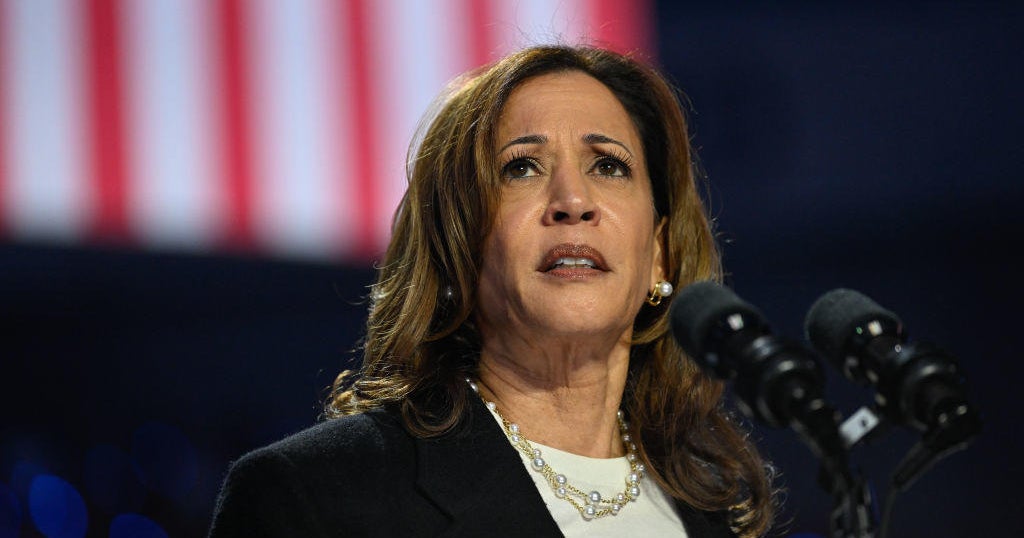CBS News
Grinning Vladimir Putin suggests support for Kamala Harris as U.S. accuses Russia of election interference

A grinning Russian President Vladimir Putin said Thursday that he supported Vice President Kamala Harris over former President Donald Trump in the upcoming U.S. presidential election. His remark came just hours after the Biden administration accused Russia of a widespread, sophisticated election interference campaign.
Two Russian women have been charged in an indictment unsealed in New York on Wednesday with funneling millions of dollars to a U.S. company that paid online influencers to push narratives favorable to the Kremlin.
“I said that our ‘favorite,’ if I may say so, was the incumbent President Mr. Biden. He was removed from the race, but he recommended that all his supporters support Ms. Harris. So we will do the same, we will support her,” Putin said, smiling wryly at an economic forum in Vladivostok.
Getty
“She laughs so expressively and infectiously that it means that everything is fine with her. And if everything is fine with her — then Trump has introduced so many restrictions and sanctions against Russia that no president has ever introduced before — and if everything is fine with Ms. Harris, then maybe she will refrain from such actions of this kind,” Putin continued in what appeared to be a sarcastic tone.
The Russian government has previously mocked U.S. allegations of political meddling, including with a tongue-in-cheek 2017 social media post offering “election interference” services.
The Biden administration accused Russia on Wednesday of attempting to interfere in the November election, including by creating fake news sites designed to covertly spread Russian propoganda among Americans.
At a meeting of the Election Threats Task Force, which included FBI Director Chris Wray and other top officials in the Justice Department, attorney General Merrick Garland said Russia Today, known as RT, a media outlet funded by the Russian state, had implemented a scheme to fund a Tennessee-based company to create and disseminate content that was consistent with Russia’s goals of pushing division within U.S. society and undermining support for Ukraine.
Garland said the Justice Department had seized 32 internet domains that pro-Russian actors and the Russian government had used to engage in a “covert campaign to interfere and influence the outcome of our country’s elections.”
“This is deadly serious and we are going to treat it accordingly,” Garland said.
According to documents submitted by the Justice Department, one of the Russian campaigns, called the “Good Old USA Project,” aimed to reduce President Biden’s confidence rating among Americans before he dropped his reelection bid. The document appeared to have been prepared in late 2023.
Targets for the propaganda included residents of “conservative states where traditional values are strong who more often vote for candidates of” an unidentified political party. Though redacted, the document appears to refer to the Republican Party.
Documents about another Russian campaign, called the “U.S. Social Media Influencers Project,” described the Republican Party as “currently advancing a relatively pro-Russian agenda” that can be “exploited by posing as ardent [Republicans] and relaying the part of their agenda that coincides with ours.”
In July, U.S. officials with the Office of the Director of National Intelligence, the FBI and the Department of Homeland Security indicated that Russia was working to boost Trump’s candidacy in this election cycle, as it did in 2016 and 2020, though they did not directly name his campaign.
“We have not observed a shift in Russia’s preferences for the presidential race from past elections, given the role the U.S. is playing with regard to Ukraine and broader policy towards Russia,” an ODNI official said in a July 9 election security update.
,
and
contributed to this report.
CBS News
Trump created the controversial $10,000 SALT deduction cap. Now he wants to end it.

Former President Donald Trump, an avowed proponent of tax cuts, is floating the idea of reversing a measure passed during his tenure in the White House that effectively raised taxes for many U.S. homeowners.
In a post Tuesday on Truth Social, Trump suggested he would scrap a $10,000 cap on deducting state and local taxes (SALT) that was passed as part of the 2017 Tax Cuts and Jobs Act — a massive revamp that he has said boosted economic growth.
Now, in the run-up to the November election, Trump said in the post he would “get SALT back, lower your taxes, and so much more,” although he stopped short of offering details. Trump made the post ahead of a speech he’s giving Wednesday at the Nassau Coliseum on Long Island.
Trump’s new proposal for getting rid of his $10,000 SALT deduction cap comes as the presidential hopeful is pitching several additional tax cuts that would, if enacted, reduce taxes for major groups of voters. He’s also vowed to eliminate taxes on Social Security benefits, a pledge that could get support from the nation’s senior citizens, as well as to end income taxes on tipped workers and on overtime pay, ideas that would help lower- and middle-income Americans.
Yet Trump’s reversal on the SALT deduction has sparked skepticism from lawmakers as well as economists and policy experts.
“So … now Trump is against the SALT tax cap which *checks notes* is a key part of the — only — major piece of legislation passed during his administration?” noted Chris Koski, a political science professor at Reed College in Portland, Oregon, on X.
Rep. Tom Suozzi, a Democrat from Nassau, Queens, said in a statement on Wednesday that he is “happy that the former president is saying that he has finally reversed his devastating decision in 2017 to cap the State and Local Tax (SALT) deduction.” He also urged Trump to convince Republican lawmakers to vote to restore the full deduction “if he is truly serious.”
The SALT deduction cap “has been a body blow to my constituents for the past 7 years,” Suozzi added.
Senator Chuck Schumer, a Democrat from New York, wrote on X,”Donald Trump took away your SALT dedications and hurt so many Long Island families. Now, he’s coming to Long Island to pretend he supports SALT. It won’t work.”
Asked for details about Trump’s proposal to restore the SALT writeoff, a spokeswoman for the Trump campaign told CBS MoneyWatch: “While his pro-growth, pro-energy policies will make life affordable again, President Trump is also going to quickly move tax relief for working people and seniors.”
Here’s what to know about the SALT deduction.
What is the SALT deduction?
The state and local tax deduction allows taxpayers who itemize to deduct property taxes, sales taxes and state or local income taxes from their federal income taxes. Prior to the Tax Cuts and Jobs Act, there was no limit on how much people could deduct through the SALT deduction.
But the 2017 tax overhaul passed under Trump limited the deduction to $10,000 – a blow to many homeowners in states with high property taxes, many of which are Democratic leaning. At the time of the law’s passage, the Treasury Department estimated that almost 11 million taxpayers in high-tax states like New York and New Jersey would forfeit $323 billion in deductions.
Who benefits from the SALT deduction?
Homeowners with high property taxes, such as people in New York, New Jersey and California, were the biggest beneficiaries of the the full SALT deduction.
But some experts also noted that the SALT deduction primarily put more money in the pockets of higher-earning Americans. About 80% of the full SALT deduction had helped people earning more than $100,000 a year, according to the Tax Foundation.
What happened after Trump capped the SALT deduction at $10,000?
The limit has increasingly impacted middle-class homeowners across the U.S. because of rising property taxes and incomes. Some lawmakers have also sought to either repeal or increase the SALT cap, but none of those efforts have borne fruit.
Earlier this year, some lawmakers sought to double the SALT deduction cap to $20,000 for married couples, with the change retroactive for the 2023 tax year. But that bill was blocked in the House in February.
Won’t the SALT deduction cap expire anyway?
Yes, the SALT deduction cap is a provision that’s due to expire in 2025, as are many other parts of the Tax Cuts and Jobs Act, such as a reduction of the individual tax brackets. But Trump has previously indicated he wants to extend the provisions in his signature tax law.
How much would it cost the U.S. to repeal the SALT deduction cap?
It won’t be cheap, according to the the Committee for a Responsible Federal Budget, a think tank that focuses on budget and policy issues.
Eliminating the $10,000 deduction limit “would increase the cost of extending the 2017 Tax Cuts and Jobs Act (TCJA) by $1.2 trillion over a decade,” the group estimates, adding that such a measure would be a “costly mistake.”
Extending the TCJA’s tax cuts would increase the nation’s deficit by $3.9 trillion over the next decade, the group estimates. By adding in a expiration or repeal of the SALT deduction cap, that would grow to $5.1 trillion, it added.
“Lawmakers should not extend the TCJA without a plan to – at a minimum – offset the costs of extension, but ideally the plan would raise revenues relative to current law and help put the nation’s debt on a better trajectory,” the group said in a statement.
CBS News
What Kamala Harris told Latinos at Congressional Hispanic Caucus event

Watch CBS News
Be the first to know
Get browser notifications for breaking news, live events, and exclusive reporting.
CBS News
Craigslist founder Craig Newmark makes $100 million cybersecurity pledge

Craig Newmark, the founder of online classified-ads site Craigslist, thinks the U.S. has a cybersecurity problem.
The entrepreneur turned philanthropist has pledged to donate $100 million to help safeguard the country from potential future cyberattacks, the Wall Street Journal first reported. Newmark will allocate $50 million to protect infrastructure, like power grids, from cyberattacks, including from foreign nations. The other half of his donation will be put toward educating the general public about how to safeguard their personal information, according to the report.
Newmark, 71, retired from the company he founded in 2018.
“The country is under attack,” Newmark told the Wall Street Journal. He said that cybersecurity experts who are working to protect the country from attack “need people to champion them.”
Today, many households make use of connected appliances or smart devices that can make them vulnerable to being hacked by criminals. At the corporate level, cyberattacks have become increasingly common.
“In the current cyberwar, the fight is on our own shores, and we all need to play an active role for the protection of our country and ourselves,” Newmark writes on his website.
In June, a hacking group took down CDK Global’s software platform, crippling auto dealerships across the U.S. CDK said that hackers demanded a ransom in order to restore its systems. In February, hackers infiltrated payments manager Change Healthcare, paralyzing segments of the U.S. Health care system. They are but two examples of the tremendous repercussions a cyberattack can have on an industry.
As part of his latest commitment, Newmark, who has pledged to give away nearly all of his wealth to charity, is making donations to a project out of the University of Chicago’s public policy school that trains cybersecurity volunteers to strengthen local infrastructure. Child internet-safety group Common Sense Media, is another beneficiary, according to the WSJ report.
The large majority of the $100 million pledge has not yet been allocated, and organizations can apply for donations through Newmark’s philanthropic organization, Craig Newmark Philanthropies.
On the foundation’s website, Newmark says he likes to donate to organizations that he believes in and lets them spend the money as they see fit. “Okay, what I do is find people who are really good at their jobs, and who can tolerate my sense of humor. I provide them with resources, and then get outta their way,” he states.
In addition to cybersecurity, other causes Newmark champions include support for military families and veterans, safeguarding trustworthy journalism and pigeon rescue.









